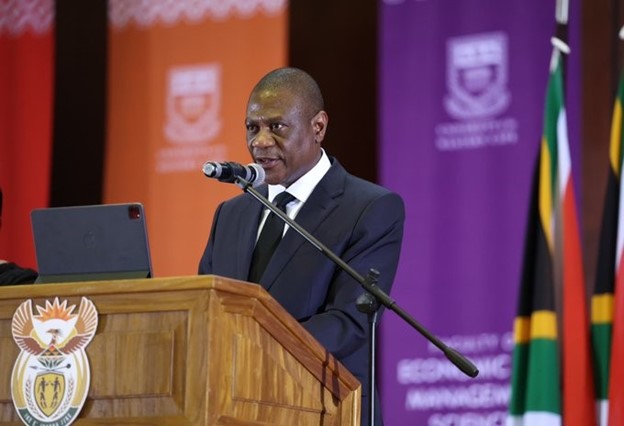By Charles Molele
Deputy President Paul Mashatile has described former labour minister Membathisi Mdladlana as a great leader, who was drawn to the labour movement from the earliest days of his career to “ensure that South Africa’s workforce received fair treatment and protection under the law”.
Mdladlana passed away last week at the age of 72 following a short illness.
Delivering the eulogy at Mdladlana’s Special Official Memorial Service in Cape Town, Mashatile highlighted Mdladlana’s many roles as an activist, a unionist and teacher, saying he was a lifelong champion of human rights, and “one of the architects of the new South Africa”.
Mdladlana was appointed as an MP in Nelson Mandela’s Cabinet in 1994, and became the labour minister four years later. He retained the position until 2009.
Mashatile said that Mdladlana understood that a thriving economy depended on the wellbeing of its workers and fought to ensure that South Africa’s workforce received fair treatment and protection under the law.
“During his tenure, he fully implemented the Basic Conditions of Employment Act of 1997, one of the most significant pieces of legislation,” Mashatile told mourners.
“This Act guaranteed fair working hours, decent wages and safeguards against exploitation for workers. In tandem with the Labour Relations Act of 1995, these laws strengthened workers’ rights and provided a clear framework for resolving labour disputes, which led to a reduction in industrial action and improved labour relations.”
After training as teacher, Mdladlana began organising teachers in Gugulethu and Crossroads in Cape Town in the late eighties, “a time when the various teacher organisations were deeply divided along racial lines”.
He was an organiser and leader in the South Western African Teachers Association, the Peninsula African Teachers Association and the Cape African Teachers Union.
He also played a key role in the establishment of the South African Democratic Teachers’ Union in 1990 and spearheaded the negotiations that resulted in the union’s official recognition.
“The declaration by Sadtu of a national teachers’ strike in 1993 was a pivotal moment in our journey to democracy,” said Mashatile.
“As it has been written, this was the first time a teachers’ organisation assumed centre stage in the education struggle in pre-democracy South Africa. It demonstrated the militancy of teachers in pursuit of better conditions of service and a transformed education system with free, quality public education at its core.”
Mashatile added that with Mdladlana at the helm, the teachers’ union tirelessly campaigned for the rights of female workers, and for them to enjoy the same rights as their male counterparts.
“This is a proud legacy that continues to this day,” he said.
At the time of his death, Mdladlana was serving as South African high commissioner to Canada.
INSIDE POLITICS

